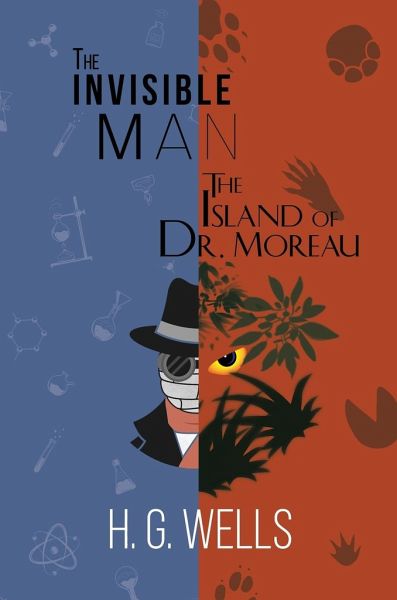
The Invisible Man and The Island of Dr. Moreau (A Reader's Library Classic Hardcover)
Versandkostenfrei!
Versandfertig in 1-2 Wochen
19,99 €
inkl. MwSt.

PAYBACK Punkte
10 °P sammeln!
The crying sounded even louder out of doors. It was as if all the pain in the world had found a voice. Considered one of the father's of Science Fiction, H. G. Wells was a prominent and influential author of the late 19th century and early 20th century. Two of his greatest novels come together in this beautiful hardcover edition of The Invisible Man and The Island of Dr. Moreau. This Invisible Man: A curious man, wearing a long coat, a wide-brimmed hat, and whose face is entirely swathed in bandages save for an obvious fake pink nose, walks into an English inn to the shock of many of the towns...
The crying sounded even louder out of doors. It was as if all the pain in the world had found a voice. Considered one of the father's of Science Fiction, H. G. Wells was a prominent and influential author of the late 19th century and early 20th century. Two of his greatest novels come together in this beautiful hardcover edition of The Invisible Man and The Island of Dr. Moreau. This Invisible Man: A curious man, wearing a long coat, a wide-brimmed hat, and whose face is entirely swathed in bandages save for an obvious fake pink nose, walks into an English inn to the shock of many of the townspeople. Beakers and chemicals in tow, the man demands his solitude. It's strange enough as it is until his money begins to run out and mysterious burglaries occur within the town. The Invisible Man, written in 1897, chronicles the bizarre interaction between the citizens of a small town and a man who had discovered how to turn himself invisible. The Island of Dr. Moreau: Shipwrecked in the south Pacific Ocean, Englishman Edward Prendick awakens aboard a ship where a man named Montgomery and his beastly looking servant were transporting animal cargo. Soon, together they arrive on an island and more and more of these bizarre humanlike creatures appear. Prendick senses a sinister secret to the island after he meets with the owner, a one Dr. Moreau... Ahead of its time, The Island of Dr. Moreau features the ideas of genetic manipulation half a century before the discovery of DNA.












